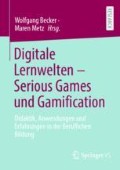Zusammenfassung
Alexandros Karagkasidis, Axel Lehmann und Marko Hofmann berichten über eine automatisierte Erfassung und Auswertung von Spielerhandlungen in simulationsbasierten Serious Games. Solche Analysen sind eine der Kernfunktionen in Serious Games, da sie ein Feedback hinsichtlich der didaktischen Lernziele oder die Errechnung der im Szenario erzielten Scoring‐Punkte ermöglichen. In diesem Beitrag werden Erfahrungen mit der Umsetzung von zwei Ansätzen für die Analyse und Auswertung von Spielerhandlungen, die für ein Serious Game im Rahmen einer Forschungsstudie entwickelt worden sind, sowie Erkenntnisse aus einer Literaturrecherche vorgestellt.
Access this chapter
Tax calculation will be finalised at checkout
Purchases are for personal use only
Literatur
Anderson, J. R. (1988). The expert module. In M. Polson & J. Richardson (Hrsg.), Foundations of intelligent tutoring systems (S. 21–53). Lawrence Erlbaum Associates.
Georgievski, I., & Aiello, M. (2015). HTN planning: Overview, comparison, and beyond. Artificial Intelligence, 222, 124–156. https://doi.org/10.1016/j.artint.2015.02.002.
Hofmann, J. (2020). Ein Physiologiemodell für Tactical Combat Casualty Care Training in mobilen Serious Games. Springer Nature. https://doi.org/10.1007/978-3-658-30202-3.
Hofmann, M., Pietraß, M., Eichenberg. Ch., Hofmann, J., Karagkasidis, A., Küsel, C., Lehmann, A., Meyer-Nieberg, S., & Ruckdeschel. P. (2020). Games for Health: Herausforderungen einer sachgerechten Entwicklung von Lernspielen am Beispiel von SanTrain. In A. Görgen & S. H. SimondKrankheit (Hrsg.) Digitalen Spielen: Interdisziplinäre Betrachtungen (S. 387–416). transcript. https://doi.org/10.14361/9783839453285-019.
Lehmann, A., Hofmann, M., Palii, J., Karagkasidis, A., & Ruckdeschel, P. (2013). SanTrain: A serious game architecture as platform for multiple first aid and emergency medical trainings. In G. Tan, G. K. Yeo, S. J. Turner, & Y. M. Teo (Hrsg.) AsiaSim 2013. Communications in computer and information science (Bd. 402). Springer. https://doi.org/10.1007/978-3-642-45037-2_35.
Nii, H. P. (1986). The blackboard model of problem solving and the evolution of blackboard architectures. AI Magazine, 7(2), 38–53.
Nkambou, R. (2010). Modeling the domain: An introduction to the expert module. In R. Nkambou, J. Bourdeau, & R. Mizoguchi (Hrsg.), Advances in intelligent tutoring systems (S. 15–32). Springer.
Tactical Combat Casualty Care Handbook, Version 5. (2017). https://usacac.army.mil/sites/default/files/publications/17493.pdf. Zugegriffen: 23. Nov. 2020.
van der Veer, G., & van Welie, M. (2000). Task based groupware design: putting theory into practice. In Proceedings of the 3rd conference on Designing interactive systems: processes, practices, methods, and techniques (DIS '00), ACM: 326–337. https://doi.org/10.1145/347642.347781.
Wenger, E. (1987). Artificial intelligence and tutoring systems: Computational and cognitive approaches to the communication of knowledge. Morgan Kaufmann.
Author information
Authors and Affiliations
Corresponding author
Editor information
Editors and Affiliations
Rights and permissions
Copyright information
© 2022 Der/die Autor(en), exklusiv lizenziert durch Springer Fachmedien Wiesbaden GmbH, ein Teil von Springer Nature
About this chapter
Cite this chapter
Karagkasidis, A., Lehmann, A., Hofmann, M. (2022). Automatisierte Analyse und Auswertung von Spielerhandlungen in simulationsbasierten Serious Games – Beispiel eines Serious Game für die Ausbildung in der taktischen Verwundetenversorgung. In: Becker, W., Metz, M. (eds) Digitale Lernwelten – Serious Games und Gamification. Springer VS, Wiesbaden. https://doi.org/10.1007/978-3-658-35059-8_6
Download citation
DOI: https://doi.org/10.1007/978-3-658-35059-8_6
Published:
Publisher Name: Springer VS, Wiesbaden
Print ISBN: 978-3-658-35058-1
Online ISBN: 978-3-658-35059-8
eBook Packages: Social Science and Law (German Language)

